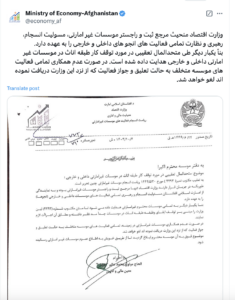In a move intensifying restrictions on women’s participation in public life, the Taliban has ordered the closure of all nongovernmental organizations (NGOs) employing Afghan women. The directive, issued by the Ministry of Economy, was made public Sunday night via X (formerly Twitter), warning that non-compliance would result in the revocation of operating licenses in Afghanistan.
This decision follows a series of measures limiting women’s roles in the workplace. Two years ago, the Taliban instructed NGOs to suspend the employment of Afghan women, citing alleged violations of Islamic dress codes. The Ministry has now escalated its stance, threatening full suspension of operations for non-compliance.

According to the Ministry, it holds exclusive authority over registering and regulating NGOs within Afghanistan. The directive, shared with the Agency Coordinating Body for Afghan Relief & Development (ACBAR), urged the organization to enforce the new rules among affiliated NGOs, referencing a previous directive issued under letter No. (2293).
The Ministry emphasized that NGOs defying the order would face severe consequences, including license cancellation and halting all activities. “The necessary actions will be taken accordingly,” the letter warned.
The decision has drawn widespread concern from humanitarian groups and international observers. Women are critical to NGO operations in Afghanistan, especially in delivering aid to vulnerable populations, such as women and children, in conservative areas where male staff often face cultural barriers.
Aid organizations and foreign governments have consistently condemned similar restrictions, warning they could further isolate Afghanistan and worsen its humanitarian crisis. Since regaining power in August 2021, the Taliban has systematically imposed limits on women, banning them from secondary and higher education, many forms of employment, and access to public spaces.
Observers fear the latest directive will severely disrupt humanitarian assistance and deepen the plight of Afghanistan’s most vulnerable communities.
